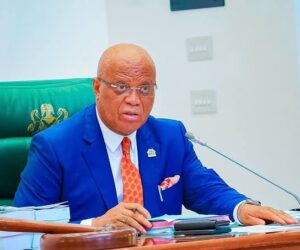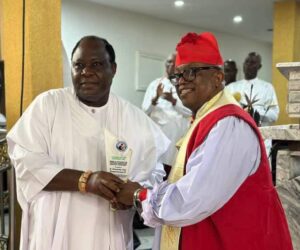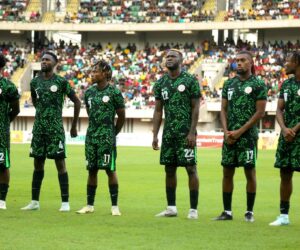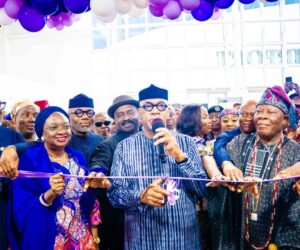The Speaker of the House of Representatives, Abbas Tajudeen, has warned that Nigeria’s rising debt levels pose a significant threat to fiscal stability, development, and the welfare of future generations unless urgent action is taken.
Mr Tajudeen, qwho was represented by the House Leader, Julius Ihonvbere, gave the warning on Monday at the opening of the 11th West African Association of Public Accounts Committees (WAAPAC) Conference in Abuja.
The annual gathering brought together lawmakers, financial experts, and development partners from across the sub-region to deliberate on the theme, “Strengthening Parliamentary Oversight of Public Debt: The Role of Finance and Public Accounts Committees.”
The Speaker described the forum as timely, given Nigeria’s present economic reality and the wider African debt crisis.
He cautioned that the country’s debt profile had now reached a critical point, underscoring the urgency of reforming oversight mechanisms and ensuring that all borrowing decisions are anchored in transparency, prudence, and tangible social impact.
“In Nigeria, recent available data indicate that our debt trajectory has reached a critical point, showing that as at the first quarter of 2025, the total public debt stood at ₦149.39 trillion, equivalent to about US$97 billion, with domestic borrowing making up 53 per cent and external borrowing accounting for 47 per cent.
“This represents a sharp rise from ₦121.7 trillion the previous year, underscoring how quickly the burden has grown. Even more concerning is the debt-to-GDP ratio, which now stands at roughly 52 per cent, well above the statutory ceiling of 40 per cent set by our own laws,” Mr Tajudeen said.
This breach of the country’s debt limit, according to him, signals the strain on fiscal sustainability.
It highlights the urgent need for stronger oversight, transparent borrowing practices, and a collective resolve to ensure that tangible economic and social returns match every naira borrowed, he added.
Mr Tajudeen explained that while debt, when carefully managed, could serve as a tool for national growth, reckless accumulation of liabilities had the opposite effect.
He emphasised that the effectiveness of debt oversight must go beyond parliament to include active citizen participation.
“Major borrowing proposals should be subject to public hearings, and simplified debt reports must be made available to the general public. Oversight is most effective when it is not only parliamentary but also people-driven. Citizens have the right to know, and we have the duty to inform,” he said.
He argued that borrowing should always be channelled towards infrastructure, health, education, and industries that create jobs and reduce poverty.
Reckless debt that fuels consumption or corruption, he maintained, must be rejected.
The National Assembly has in recent years approved several external borrowings for the President Bola Tinubu’s government and its predecessors, the Muhammadu Buhari administration without proper scrutiny.
A continental challenge
Beyond Nigeria’s domestic concerns, Mr Tajudeen also placed the issue within a continental context.
Citing available data, he noted that Africa’s debt profile had reached alarming proportions, with total public debt standing at US$1.8 trillion by 2022 and external borrowing expected to surpass US$1 trillion by 2023.
“Several countries are now in dangerous debt-to-GDP territory: Sudan at 344 per cent, Angola at 136.8 per cent, Ghana at 84 per cent, Kenya at nearly 70 per cent, and South Africa above 77 per cent. In many of these cases, governments are spending more on debt servicing than on healthcare and other essential services, shrinking the fiscal space available for development,” he said.
The speaker warned that this reality points to a structural crisis that demands urgent and coordinated parliamentary action across Africa.
He highlighted that the composition of Africa’s debt was itself a source of vulnerability.
“Western private lenders, including banks and asset managers, hold about 35 per cent of the continent’s debt; multilateral institutions such as the World Bank and IMF account for 39 per cent; bilateral loans comprise 13 per cent; and Chinese creditors hold 12 per cent.
“To place this in sharper focus, in 2019, bondholders alone represented 27 per cent of Africa’s external debt, making them the single largest creditor group, ahead of China at 13 per cent,” he added.
According to him, this creditor structure leaves African economies heavily exposed to global market shocks, currency volatility, and interest rate hikes.
Reform and regional action
Mr Tajudeen said the way forward was clear: African countries must take greater responsibility for their fiscal destinies by strengthening oversight institutions, investing in domestic resource mobilisation, and forging stronger regional cooperation.
He said, “The implications of this structure are far-reaching. A significant share of our national revenues is tied to debt servicing rather than being invested in the things our people need most: roads, schools, hospitals, and innovation.”
He lamented that the high cost of commercial loans, coupled with the burden of repayment in foreign currencies, leaves many African economies vulnerable to market shocks. This he said, narrows fiscal space, constrains domestic policy choices, and slows the pace of sustainable development.
To reverse the trend, he called on parliaments to act decisively.
Mr Tajudeen reaffirmed that the 10th House of Representatives remains committed to transparency and accountability in public finance management.
He disclosed that deliberate steps have been taken to strengthen oversight mechanisms, improve reporting standards, and ensure that all public funds are managed with integrity.
“In line with this commitment, I am pleased to announce Nigeria’s readiness to champion the establishment of a West African Parliamentary Debt Oversight Framework under WAAPAC.
“This framework will harmonise debt reporting across our countries, create regional standards for transparency, and empower our parliaments with timely data for effective scrutiny of borrowing practices.
“It is my conviction that this framework will strengthen our bargaining power in international finance and protect the long-term interests of our citizens,” he said.
The speaker further revealed Nigeria’s plan to work with WAAPAC and development partners to establish a capacity-building programme for Public Accounts and Finance Committees across the region.
This programme, he said, will equip legislators and staff with modern tools for debt sustainability analysis, fiscal risk assessment, and oversight of complex financial instruments.
Mr Tajudeen urged WAAPAC to build on its legacy since its establishment in 2009, calling for a stronger, more proactive body that would stand as a continental leader in fiscal accountability.
“This conference provides us with an opportunity to reflect, share experiences, and develop new strategies for debt governance that are both responsible and sustainable. As we look to the future, we must envision WAAPAC as a continental leader in fiscal accountability, expanding its reach and deepening its impact over the next decade,” he concluded.
READ ALSO: N4trn Debt: Lawmaker excited at FG-Contractors dispute resolution
PAC announces recovery of ₦200bn
Speaking earlier, the Chairman of the House of Representatives Public Accounts Committee, Bamidele Salam, announced that the committee had successfully recovered over ₦200 billion in lost revenue for the federal government in the past year.
Mr Salam explained that the recovery followed extensive investigations and audits into the financial records of ministries, departments, and agencies (MDAs) as part of the committee’s constitutional mandate.
According to him, the intervention helped block leakages, strengthen compliance with financial regulations, and reinforce public confidence in the legislature’s oversight role.
He added that the recovered funds have since been remitted to the federation account, stressing that the achievement underscored the committee’s resolve to protect scarce national resources and ensure they are used in the best interest of Nigerians.
The PAC chairman assured that the committee would intensify its efforts, not only in revenue recovery but also in promoting greater accountability, transparency, and efficiency across the public sector.












